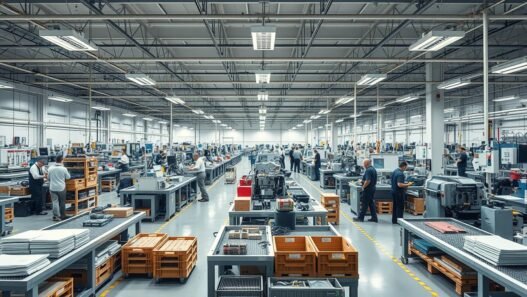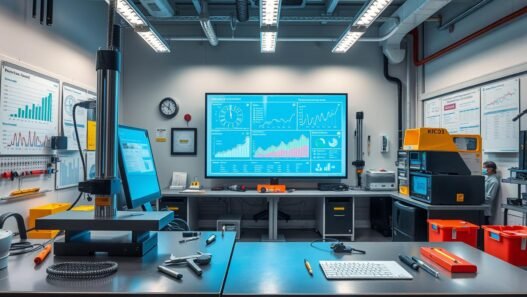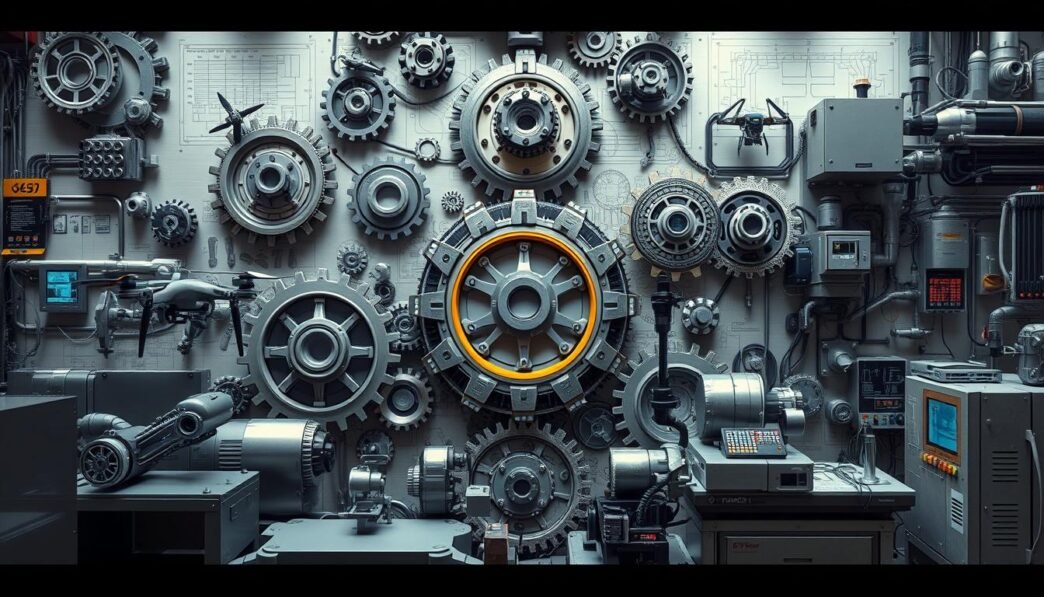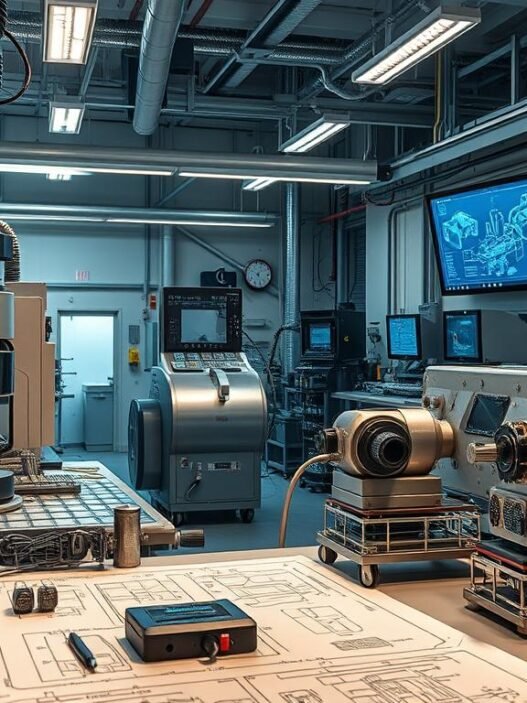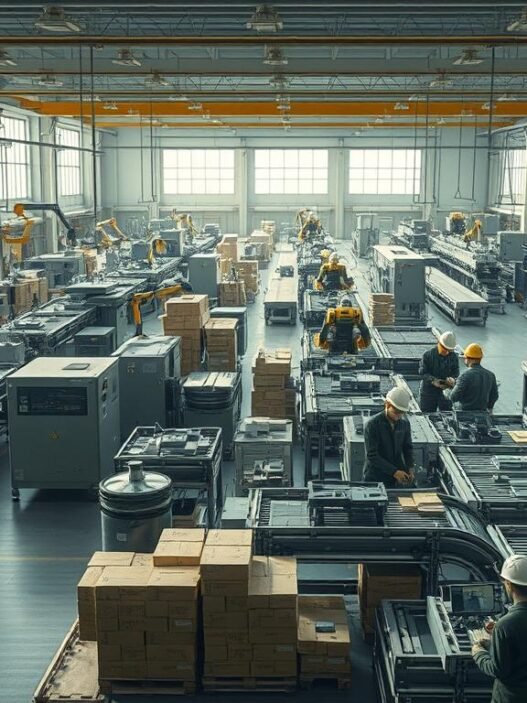Mechanical engineers shape the technologies we use every day. They touch parts of life from cars to medical devices. Their work makes our routines easier and keeps us safe. By blending physics with material science, they craft and improve mechanical systems.
This field doesn’t just improve car fuel efficiency or aerospace parts. It changes how we live. Let’s dig deeper into mechanical engineering. We’ll see how it brings radical innovations, builds essential skills, and opens various career paths. It uses engineering principles for practical problems, inviting innovative solutions.
Key Takeaways
- Mechanical engineers work across various sectors, including automotive, aerospace, and energy.
- They utilize physics and materials science in their designs and manufacturing processes.
- Innovations in mechanical engineering, such as 3D printing and smart materials, advance everyday technology.
- The field offers diverse job opportunities with competitive salaries and career growth.
- Mechanical engineers contribute significantly to improvements in safety, efficiency, and overall well-being.
The Essence of Mechanical Engineering
Mechanical engineering is vital in today’s tech world, based on physics and materials science. It started with ancient tools, like the potter’s wheel. Now, mechanical engineers use these sciences to make and study systems. They focus on safety and efficiency in different areas.
Understanding the Principles of Mechanical Engineering
This field uses many engineering principles, such as mechanics and thermodynamics. Mechanical engineers work with things like electric generators and gas turbines. These show how physics works with movement and heat. Their work in design leads to lasting and effective projects.
Importance in Daily Life
Mechanical engineering affects many parts of everyday life in various industries. It helps create better car engines and medical devices. Thanks to this field, things like elevators and air conditioners exist. It greatly improves our quality of life, proving its value everywhere.
Core Disciplines and Skills in Mechanical Engineering
Mechanical engineering is broad, covering many necessary areas of knowledge. This includes mechanics, thermodynamics, materials science, and fluid dynamics. Together, they build the foundation for engineering education. They are crucial for understanding and solving complex engineering problems.
Key Areas of Knowledge
- Mechanics: Learn about forces and movement in systems.
- Thermodynamics: Know how energy changes and moves.
- Materials Science: Look into different materials and their uses.
- Fluid Dynamics: Study how fluids move and the forces on them.
Essential Skills for Mechanical Engineers
Mechanical engineers need many technical and people skills. Important ones include:
| Hard Skills | Soft Skills |
|---|---|
| Computer-Aided Design (CAD) | Problem-Solving |
| Finite Element Analysis (FEA) | Critical Thinking |
| Thermodynamics | Communication |
| Manufacturing Processes | Teamwork |
| 3D Printing | Adaptability |
In 2024, mechanical engineers need to mix advanced technology knowledge with soft skills. Skills like teamwork, clear communication, and leadership are key for working with different engineering fields. Being good at critical analysis and careful about details helps in keeping product standards high. Being adaptable allows engineers to stay up-to-date with new technologies.
Revolutionary Mechanical Innovations
Mechanical engineering has seen amazing changes, adding new possibilities. Among them, 3D printing and new energy systems are major improvements. They are changing many fields and affecting our daily lives.
3D Printing Technology
3D printing is revolutionizing how things are made. It lets us build complex shapes easily, saving materials and cutting down on waste. From cars to healthcare, it’s being used to make detailed models and even final products.
Now, engineers can make custom prosthetic limbs using 3D printing. This shows how this technology combines personalization with efficient production.
Advancements in Energy Systems
New energy systems mark a big leap towards a sustainable world. Power plant designs are getting better, using less energy and harming the environment less. Mechanical engineers are leading the way in using renewable energy, like solar and wind. This helps cut down our dependency on oil and gas.
These improvements are not just technical wins. They show a serious commitment to making a cleaner planet.
| Innovation | Description | Impact |
|---|---|---|
| 3D Printing Technology | A layer-by-layer fabrication process that enables complex designs. | Reduces material wastage and enables customized production. |
| Advanced Energy Systems | Innovative designs and renewable energy integrations in power plants. | Enhances energy efficiency and promotes sustainability. |
| Robotics in Manufacturing | Utilizing robots in conjunction with humans to optimize productivity. | Improves safety and efficiency in production lines. |
Mechanical Engineering in Daily Life
Mechanical engineering is key in our daily lives. It influences everything from home gadgets to health tech advances. These innovations boost functionality, safety, and efficiency across many areas.
Everyday Applications
Mechanical engineers make everyday life better. They design efficient appliances and safe vehicles. Refrigerators and washing machines save energy. Cars have safety features like automatic brakes and lane assist, making roads safer.
In health tech, mechanical engineering has led to big improvements. Engineers create precise surgical tools and prosthetic limbs. Robotic-assisted surgery is now more precise, less invasive, and efficient.
Impact on Health and Safety
Mechanical engineering greatly affects health and safety. Engineers promote renewable energy and improve power systems. They help fight climate change and protect public health. Strong infrastructure from roads to bridges ensures safety and durability.
Engineers also focus on making products safe through quality control. The rise of AI and nanotech opens new possibilities for health tech and safety. This promises more future breakthroughs.

| Application Area | Examples | Impact on Daily Life |
|---|---|---|
| Household Appliances | Refrigerators, Washing Machines | Improved energy efficiency and convenience |
| Transportation | Vehicles with advanced safety systems | Enhanced road safety and efficiency |
| Health Technology | Surgical instruments, Prosthetic limbs | Improved patient care and outcomes |
| Renewable Energy | Solar panels, Windmills | Reduction of greenhouse gas emissions |
Mechanical engineering is vital in shaping our lives. To learn more about tech and systems that make life better, visit this link.
Career Paths and Opportunities in Mechanical Engineering
Mechanical engineering offers a variety of career paths. These cater to different interests and skills. It’s a field where technical know-how meets the necessity for lifelong learning and adapting to new technologies.
Diverse Job Options
Starting salaries for newcomers in this field are about $60,000 a year. Experience brings substantial salary growth. For example, biomechanical engineers earn $90,000 to $161,000 annually.
Nanotechnology engineers make on average $94,000, with senior roles reaching $152,000. Mechatronics engineers earn $93,000 to $136,000. Manufacturing engineers start at $80,000, going up to $113,000. Design engineers see earnings between $80,000 and $120,000.
Industries That Rely on Mechanical Engineers
Mechanical engineers are crucial in many industries like automotive, aerospace, healthcare, and energy. They work on projects such as fuel-efficient cars and aerospace parts. They also tackle complex challenges in these sectors.
The US Bureau of Labor Statistics forecasts a 7% growth in mechanical engineering jobs from 2020 to 2030. This means about 20,000 new job opportunities will emerge.
What Do Mechanical Engineers Do?
Mechanical engineers are vital in many areas. They work on key parts of developing and using new designs and tech. Their job mixes theory with hands-on work. This ensures projects are done well and safely.
Tasks and Responsibilities
Mechanical engineers have varied daily work, covering many parts of engineering. They mainly:
- Conceptual Design: They create early designs for products, systems, or parts.
- Prototyping: They make and test early versions to check how they work before making more.
- Testing and Analysis: Engineers test designs to make sure they meet the required standards.
- Project Management: They often manage projects from start to finish, keeping on schedule and within budget.
- Collaboration: Working with teams from different fields is common to bring parts of a project together.
They also use advanced tools to make designs safer and more efficient. Their skills turn ideas into solutions that improve the start and growth of projects.
Mechanical Engineering Disciplines
Mechanical engineering covers a wide range of specialties. Each one plays a unique role in developing new technologies. This shows how complex and vital mechanical engineering is today.
Subfields Within Mechanical Engineering
The field includes areas like:
- Robotics
- Aerospace Engineering
- Materials Science
- Energy Systems
- Thermal Engineering
- Manufacturing Engineering
Each subfield demands a strong grasp of specific principles. Engineers often work across different areas to bring new ideas to life as technology advances.
Interdisciplinary Applications
Mixing mechanical engineering with other fields is crucial now. It leads to innovations that tackle big issues across the world, such as:
- Advanced medical devices that better patient care
- Energy-saving systems that lower pollution
- Intelligent robotics that enhance manufacturing
This blending of fields opens doors to new tech solutions, boosting the impact of mechanical engineering. Working together in various areas leads to groundbreaking progress that solves major problems.
Sustainable Solutions in Mechanical Engineering
Modern mechanical engineering focuses on sustainable engineering principles. It aims to solve global environmental issues. Engineers work on eco-friendly projects that reduce harm to our planet and save energy. They use new technologies to cut down harmful emissions and make things more sustainable.
Eco-friendly Innovations
Hybrid and electric cars now use regenerative braking systems. This move helps save a lot of energy. Another big step is using 3D printing. It cuts down making time and uses less material. This makes it a great choice for making things in a more green way. Also, the lean manufacturing techniques, like those from Toyota, help make less waste and use less resources.
Energy Efficiency Contributions
Keeping manufacturing energy-efficient is key since it was a big part of emissions in 2020.
Mechanical engineers are improving our power systems, making them more reliable and efficient. With a huge increase in jobs focused on green solutions, the field is growing fast. People getting into this area can start earning between $50,000 and $70,000 a year. Over time, with more skills, they could make over $100,000. Adopting sustainable methods is crucial for a greener planet. For more details on green practices in this field, visit sustainability in mechanical engineering.
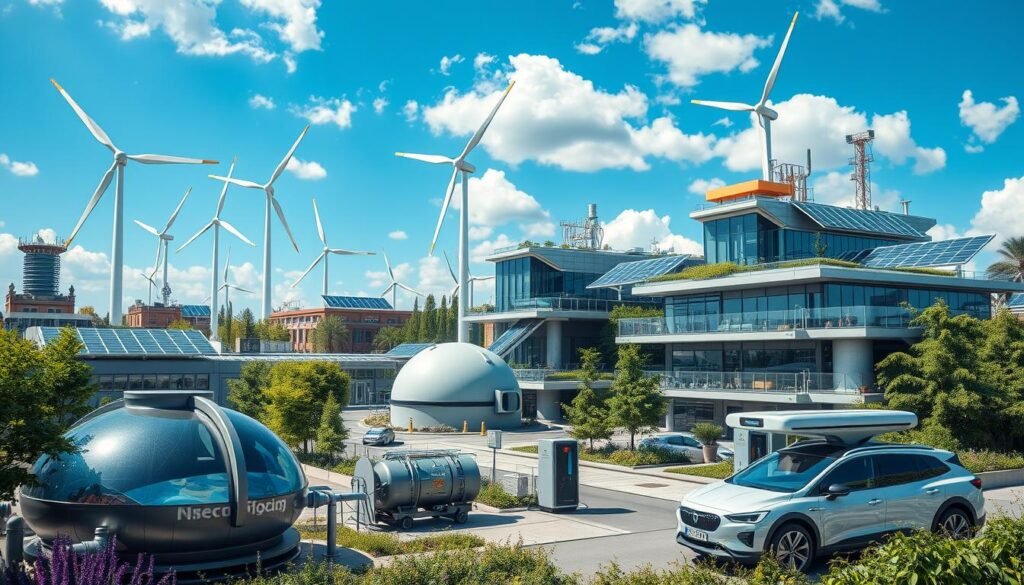
The Future of Mechanical Engineering
The field of mechanical engineering is changing fast, thanks to big tech improvements and a stronger focus on innovation. Engineers are using these changes to tackle problems and better their work methods. The push for green solutions and efficiency will guide what comes next in mechanical engineering.
Technological Advancements
Here are the major advancements impacting mechanical engineering:
- Artificial Intelligence (AI): AI is reshaping mechanical engineering. It’s making tasks automatic, refining design, and boosting quality control.
- Machine Learning (ML): This tech is key for predictive upkeep and creating self-driving vehicles. It’s making industries more efficient.
- Smart Manufacturing: As part of Industry 4.0, engineers are using smart systems. These rely on data analytics and the Internet of Things (IoT) to increase productivity.
- Sustainable Energy Technologies: Engineers lead in making new green tech like solar, geothermal, and wind energy systems.
- Healthcare Innovations: Advanced medical devices and prosthetics, like electronic “skin”, show mechanical engineering’s role in bettering health.
By 2030, jobs in mechanical engineering are expected to grow by 7%. This means more chances for experts to work on important global challenges. The adoption of new tech and a commitment to sustainability will be key for the future.
Conclusion
Mechanical engineering is extremely important. It shapes our technology and improves life all over the world. Engineers use math, physics, and materials science to make systems and machines better. Their work helps in many areas, such as making renewable energy and improving transportation. This is vital for solving today’s big challenges.
The future looks bright with mechanical engineering. It plays a big role in manufacturing, building, and creating energy. In 2022, mechanical engineers earned about $96,310 a year on average. Glassdoor reported some made even more, around $103,840. This shows that this career is not just important but also pays well.
This field keeps evolving. Engineers will be key in making solutions that are good for the environment and push technology forward. Learning about mechanical engineering’s impact from this article is important. So is looking at performance management strategies discussed here. Future engineers will lead the way in making our lives better. This area is full of chances for those who want to make a difference.

